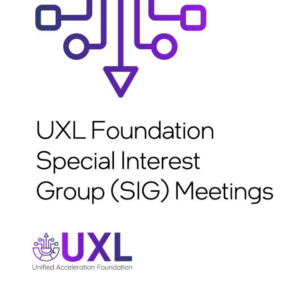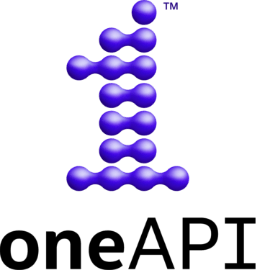UXL Foundation: Special Interest Groups (SIGs)
The UXL Foundation provides an open governance model for the open source projects that implement the oneAPI Specification.
UXL provides many of the building blocks needed for developers to write highly parallel software on a range of processors from CPUs to GPUs and beyond. The community can contribute to the open source UXL projects as well as participate in the Special Interest Groups and Working Groups.
The oneAPI Specs define APIs for a range of areas, from math, language, hardware to AI and one can propose The Get started guide will help you understand more about the UXL Foundation projects that implement the oneAPI Specification.

SIG Meetings:
The UXL Foundation’s SIGs are open to all and offer the opportunity for knowledge sharing and discussing new ideas and technologies. They bring together industry experts to help guide the oneAPI direction as well as educating our community, and act as a bridge between the community and developers working on implementations of the oneAPI specification.
Meeting minutes are public and recordings are available.
By subscribing to the mailing list for these groups you will be invited to the upcoming meetings and can get involved in the discussions. The mailing lists are available through this website.
Language SIG
This group covers topics related to language implementations that integrate with the oneAPI specification.
The Language SIG hosts discussions and presentations focused on how to integrate a broad range of languages to support oneAPI. The languages at the heart of oneAPI are C++ and SYCL. This group discusses how work done within the oneAPI open source implementations can contribute to the ISO C++ and SYCL specifications managed by ISO and Khronos respectively.
The language SIG is led by Ruyman Reyes Castro and Victor Lomuller from Codeplay.
UXL Videos: Language SIG – 2.4.2025
Presentation Slides:
Math SIG
This group covers topics related to math operations.
The Math SIG hosts discussions and presentations for fundamental mathematical routines for use in high-performance computing, engineering, financial and other applications. Functionality that is covered may include dense linear algebra, sparse linear algebra, discrete Fourier transforms, random number generators, summary statistics and vector math. In addition to domain-specific functionality, the Math SIG may also discuss overall design features like the execution model, memory model, or error handling.
The Math SIG is led by Sarah Knepper, Intel Corp.
Recent Math SIG Meeting Updates:
SiPearl and oneMath Collaboration:
Augustin Degomme from SiPearl presented on their company’s development of European high-performance, low-power microprocessors for future supercomputers. As a joint venture with the European Union and other partners, SiPearl has secured over 100 million euros in funding to improve the HPC ecosystem by optimizing code performance on their platforms.
The presentation focused on integrating Arm Performance Libraries (ArmPl) with oneMath. ArmPl functions similarly to Intel oneMKL but is optimized for the Arm platform with vectorization support across various platforms and compilers. Adding an ArmPl backend to oneMath aims to provide comprehensive ecosystem support for HPC community code running on SiPearl processors.
Implementation Progress
- BLAS: First backend ported and integrated with support for aarch64 CPUs (both ArmPl and Netlib)
- LAPACK: Backend previously developed, recently revived using the same LAPACKE interface as ArmPl
- OpenRNG: ArmPl’s drop-in replacement for Intel VSL library, facilitating easier implementation into oneMath
The team evaluated oneMath performance across multiple platforms, including Intel Sapphire Rapids, Ampere Altra, and Nvidia Grace, with BLAS/LAPACK/RNG domains now available for aarch64 CPUs with near-native performance.
Discussion Points
- Viraj Malia (Intel) noted that while oneMKL provides interface wrappers for FFTW, they function around DFTI APIs, which is contrary to what’s needed.
- Chris Goodyer (Arm) confirmed most reported bugs have been fixed, with remaining RNG issues expected to be resolved next month.
- Augustin highlighted challenges in thread pinning and process allocation with oneMath compared to Intel oneMKL with CBLAS and FFTW.
- Chris Goodyer discussed performance graph results and availability of batched GEMM functions in oneMath, offering to add functions upon request.
- Sarah Knepper inquired about adding interleaved batched APIs to the oneMath specification.
- Chris Goodyer recommended waiting for a new sparse standard before implementing this feature.
- Biagio Cosenza (University of Salerno) asked whether the generated code is vector length agnostic or specific, with Chris confirming it’s vector length agnostic.
Updates
Sarah Knepper (Intel) announced the release of oneAPI specification version 1.4 and the renaming of oneMKL to oneMath, which now supports ArmPl backends, cuSparse and rocSparse backends, and adds a new geometric distribution to the RNG device API.
Action Items
Viraj Malia proposed supporting Docker containers for the oneMath project to improve usability and maintenance. He will initiate a discussion in the oneMath project to gather community feedback on Docker container support.
UXL Video: Portable SYCL code using oneMKL on AMD, Intel and Nvidia GPUs (APAC)
Presentation Slides:
- UXL-Math-SIG-2025-02-26_AugustinDegomme-SiPearl-OneMathArmPlbackends.pdf
- UXL-Math-SIG-2024-10-02_RaphaelEgan_set_get_value.pdf
Artificial Intelligence (AI) SIG
This group covers topics related to AI operations.
The AI SIG hosts discussions and presentations focused on Artificial Intelligence (AI) topics. This covers new features in the oneDNN, oneDAL and other projects, integration with frameworks such as PyTorch and TensorFlow, and introductions to projects using the UXL Foundation projects.
The AI SIG is led by Penporn Koanantakool, Google and Jian Hui Li, Intel.
Recent AI SIG Meeting Updates:
- Extend OneDNN Operators/APIs for AI Chips – Leping Wang, En Saho
(slides) - AI Use Cases with oneDNN on Arm – Ashok Bhat
(slides)
Leping Wang, Beijing Institute of Open Source (BOSC) discussed the importance of extending the OneDNN (OneAPI Deep Neural Network Library) APIs for unified computing platforms. He highlighted the need to make OneDNN the go-to backend for machine learning frameworks like TensorFlow and PyTorch.
Leping also shared observations from their internal projects, which led to a survey comparing OneDNN with cuDNN. He noted that OneDNN can work with other GPUs and AI accelerators, despite documentation suggesting otherwise. Leping proposed adding four primitive APIs to OneDNN: divisive normalization, multi-head attention (MHA), image to column, and CTC loss.
Mourad Gouciem, Intel suggested that MHA is currently supported through oneDNN Graph API and it is more flexible this way (complex op with primitive API is hard to use/configure to optimize a class of patterns with small variations).
Leping explained the motivation behind matching oneDNN with cuDNN APIs. The main goal is to use OneAPI as middleware to connect AI frameworks with various hardware backends, especially for domestic TCUs and NPUs. This approach allows hardware vendors to support OneAPI once and connect to multiple AI frameworks. Leping also mentions that OneAPI could be used for direct AI programming.
When questioned about the need for this approach given existing Aten implementations in PyTorch and TensorFlow, Leping clarifies that it would help hardware vendors connect to multiple frameworks more easily and allow for general optimization methods in OneAPI.
Ashok discussed the hardware features of Arm that aid in Machine Learning (ML), including Bfloat16 support and matrix multiply extensions. He explained how the software team makes these features available to higher-level frameworks like PyTorch and TensorFlow.
Ashok introduced the Kleidi technology, which directly contributes to frameworks to provide the fastest implementation, typically an assembly. Ashok presented performance improvement numbers for PyTorch using OneDNN, showing a 2.9x improvement in the T5 translation case. He also discussed the impact of community project openness on the project’s design, integration strategy, and release dates. He emphasized the need for community participation to make the project more long-term.
Mourad responded that oneDNN has established an RFC process to openly discuss new features and internal architecture changes, and oneDNN release schedule is public (here), aligned with major AI frameworks release in general.
Mourad discussed the need for improvement in the validation of releases and testing to address the challenges of framework integrating different versions, particularly in the context of arm and intel. He suggested that a common infrastructure for testing could be beneficial.
Ashok agreed and suggested that his team was already working on some of these issues and that there was an ongoing effort to reduce the delay between a feature being developed and its eventual use in Pytorch.
Ashok discussed the challenges of integrating features into the Arm Compute Library and the creation of Arm Kleidi AI to address these issues. Penporn highlighted the benefits of the microkernel API in frameworks like TensorFlow and OpenXLA, and suggested integrating Kleidi AI with the oneDNN microkernel API. The team agreed on the need for greater portability and flexibility in their framework integration.
UXL Video:
https://www.youtube.com/watch?v=de27cQ7b9S8
https://www.youtube.com/watch?v=4dzQiIZY8yI
Presentation Slides:
- 2025-03-06-UXL-Extend_onednn_Operators_Apis_For_AI_Chips_RFC_Bosc_LepingWang.pdf
- 2025-03-06-AI_use_cases_with_oneDNN_on_ARM_ARM_AshokBhat.pdf
Hardware SIG
This group covers topics related to the integration of hardware and how this is defined in the oneAPI specification.
The Hardware SIG hosts discussions and presentations focused on how to enable a broad range of hardware architectures.
The Hardware SIG is led by Alastair Murray, Codeplay and Will Damon, Intel.
UXL Video:
Introduction by Alastair Murray, Codeplay
AI systems on FPGA using oneAPI, Jeremy Bennett, Embecosm and James Betson,University of Southampton
Presentation Slides:
- https://github.com/uxlfoundation/foundation/blob/main/hardware/presentations/2024-02-15-oneAPI-Construction-Kit.pdf
- https://github.com/uxlfoundation/foundation/blob/main/hardware/presentations/Imagination_Technologies_Enabling_Compute_Hardware.pdf
RESOURCES
- The public calendar of UXL Foundation meetings is available using Google Calendar
- Join the Slack workspace to take part in the discussions and conversations.

